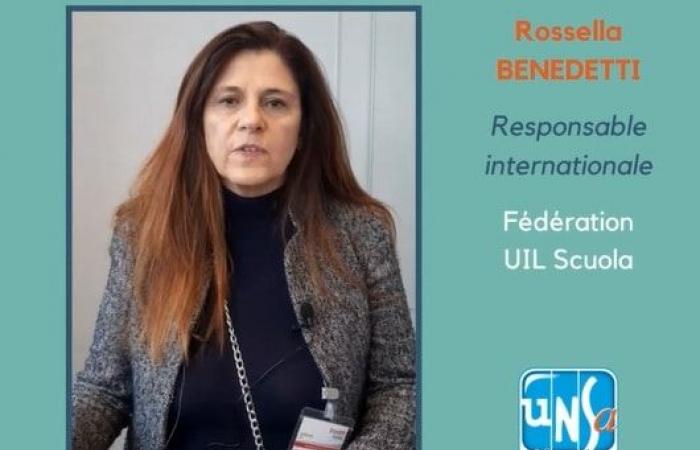UNSA education: What is the educational news in Italy for this new school year?
Rossella Benedetti: As usual, at the end of summer, the start of the school year is disrupted by problems of recruiting teachers and non-teaching staff who work in each school. Schools in Italy benefit from administrative and didactic autonomy. Staff with a permanent contract and annual replacements are recruited by the Ministry of National Education. Short-term replacements directly by schools, according to a provincial list. We have two kinds of problems here: the staff recruited on a permanent basis are not enough and many positions remain empty; the algorithm used to recruit replacements does not work as it should and the ministry refuses to provide access to the source code of the software used so that the unions can give their opinion and resolve the problems. To give some figures: in 2015, the number of teachers with a replacement contract was half the figure for 2023. A quarter of teachers in service in 2024 are precarious. Same problem for non-teaching staff.
The situation is even more serious for teachers supporting children with disabilities. Inclusion is difficult. However, the minister plans to resolve the problem of quality of service by proposing that families of children with disabilities validate and choose the support teacher for their own child. Meanwhile, the European Court of Justice has again condemned Italy for the abuse of fixed-time contracts for recruitment in public education. Same story for non-teaching staff who, moreover, find themselves facing even more difficult working conditions due to certain changes included in the last collective agreement, which only Federazione UILSCUOLA RUA refused to sign.
EU: What is the opinion of UIL Scuola Rua on Georgia Meloni’s latest educational reform which concerns student behavior and their evaluation in particular?
RB: Incidents of violence against teachers or students are increasing in our schools. Legislation already exists that penalizes acts of violence committed by third parties against school staff. However, this new bill, whose motivations we could support because it aims to restore respect within schools, does not seem useful to us in terms of educational rehabilitation of the student responsible for acts of violence within the school. ‘school. The time spent in school for children who misbehave would be extended, but we are opposed to the idea of introducing “solidarity citizenship” activities into schools in suspension of the school context to which they belong. Indeed, we believe that it is not possible to become aware of all the implications of errors, even serious in certain cases, made by students, outside the school to which they belong.
In short, we do not believe in punishment as an end in itself, nor in measures that can encourage dropping out of school, but it is necessary to reintroduce a culture of respect in educational action, also and above all involving families. , the community and the students themselves, starting with the language used on a daily basis. This cannot be done if we continue to adopt austerity measures, reduce staff, increase the number of students per class and lack resources to diversify educational action.
EU: How is social dialogue going with the government and what measures are you demanding from the Italian government for education?
RB : Negotiations with the government for collective agreements and other aspects of the profession have not been easy since the 1990s, and it is even worse with right-wing governments. The latest negotiation started with a small gesture by reaching an agreement for a small salary increase that the previous government had already planned but not carried out. After that, almost nothing. The minister only speaks with complacent unions who signed the collective agreement which has just expired (one is negotiated every three years).
Workers’ rights are being reduced more and more, schools continue to be closed and teaching and non-teaching staff positions are being reduced. We are asking to reintroduce into the collective agreement that we are now discussing the rights eliminated in recent years, to eliminate the “annual transfer blocks”, as well as a salary increase sufficient to compensate for inflation in in recent years and finally the tenure of precarious teachers, who for years have guaranteed service in public schools. We also call for more effective recruitment procedures for both teachers and school leaders.
EU: What has been the outcome for schools in general since Georgia Meloni came to power?
RB : Rather negative, notably with the strengthening of ultra-Catholic movements which try to prevent any speech about diversity or women’s rights.






